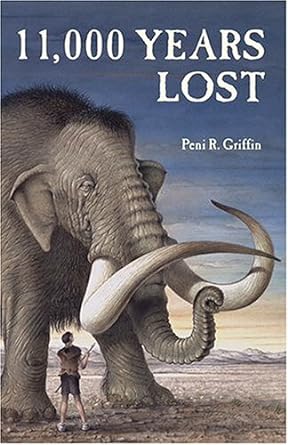I love time travel stories. With a delightful storyline, the middle grade novel 11,000 Years Lost by Peni R. Griffin (Harry Abrams, 2004) tells about an eleven-year-old young girl who travels 11,000 years into the past, weaving true facts about the Clovis civilization (a prehistoric group who lived in the southwestern United States) and archaeological studies into her fictional tale about family and survival. The author has created a work of fiction but so many of the details about the family’s life echo a true archeological framework that the novel as a whole provides the reader with a connection to the past that helps pre-history come to life.
What’s more is that Griffin manages to avoid some of the time travel troupes that diminish a good story. Esther magically travels back in time through a portal, but in the historic world, she still must learn the language. There’s no magical understanding and miraculous ability invested in her. She struggles with blisters and starvation along with the others as she adapts to a new life. When she does return to the present time, there is a mystical explanation for the time travel, but also, time has still passed in the present and she must readjust to present day ease after her unique experience.
There are plenty of magical elements in the book to make it a fantasy: Esther’s supposed powers to help the family on the hunt, dream walkers, fortune tells, and of course, the actual time travel all remain unrealistic. As a whole, however, Esther builds realistic relationships, comes to love her family group, and realistically faces the same prehistoric challenges the fictional Clovis people faced. Her magic adventure shows the reader just how we are connected to the past, through time. It underscores the universal nature of love and survival. Finally, it builds up prehistoric civilization as a distinct unique culture in the development of modern civilization. No one should dare call our prehistoric ancestors uncivilized after reading 11,000 Years Lost.
Find 11,000 Years Lost on Amazon.

